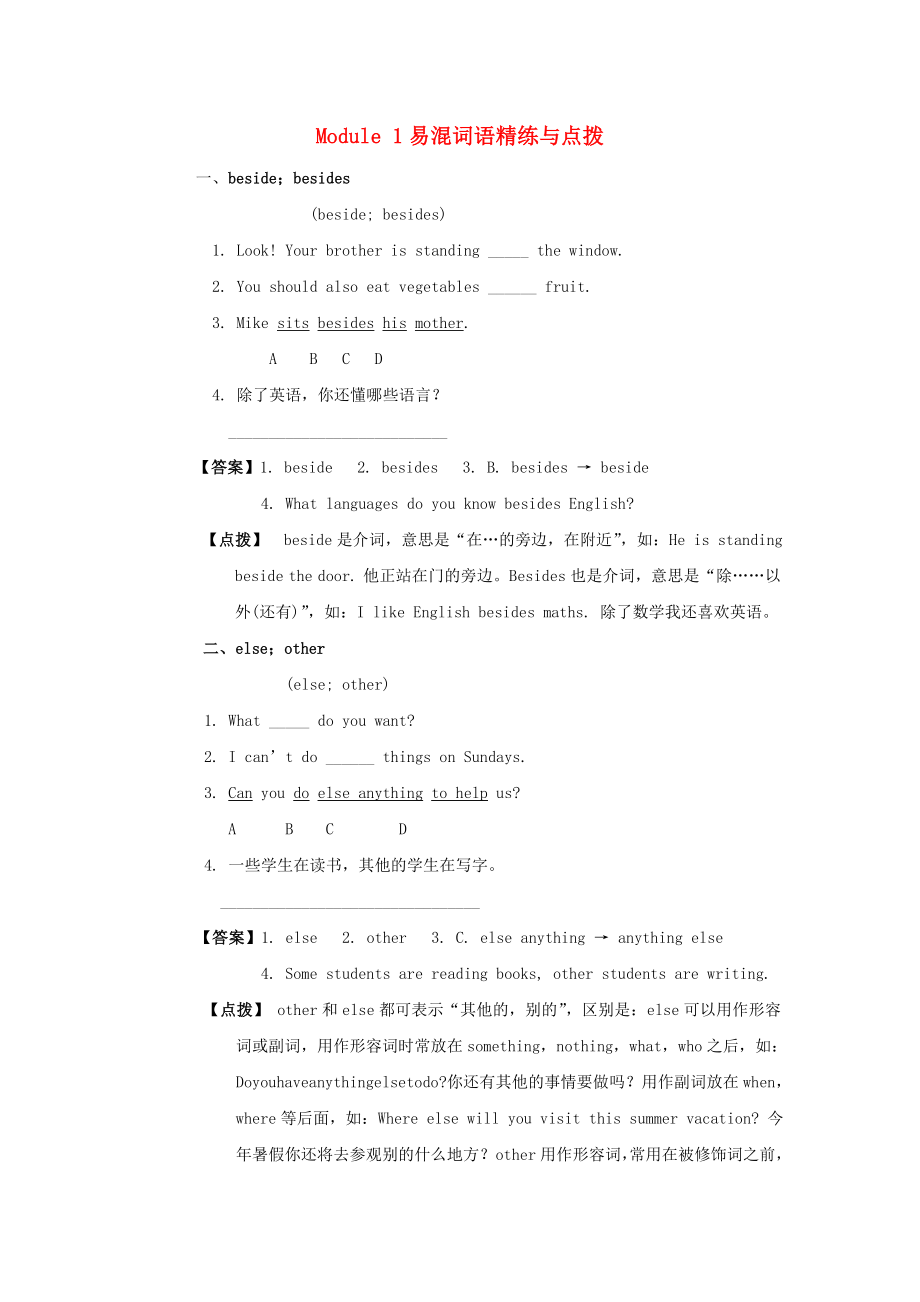《2013年九年級(jí)英語(yǔ)上冊(cè) Module 1 Wonders of the World易混詞語(yǔ)精練與點(diǎn)撥 外研版》由會(huì)員分享,可在線閱讀�,更多相關(guān)《2013年九年級(jí)英語(yǔ)上冊(cè) Module 1 Wonders of the World易混詞語(yǔ)精練與點(diǎn)撥 外研版(2頁(yè)珍藏版)》請(qǐng)?jiān)谘b配圖網(wǎng)上搜索。
1��、Module 1易混詞語(yǔ)精練與點(diǎn)撥
一�、beside;besides
(beside; besides)
1. Look! Your brother is standing _____ the window.
2. You should also eat vegetables ______ fruit.
3. Mike sits besides his mother.
A B C D
4. 除了英語(yǔ)��,你還懂哪些語(yǔ)言����?
___________________________
【答案】1. beside 2. besides
2、 3. B. besides → beside
4. What languages do you know besides English?
【點(diǎn)撥】 beside是介詞�,意思是“在…的旁邊,在附近”���,如:He is standing beside the door. 他正站在門的旁邊�。Besides也是介詞�,意思是“除……以外(還有)”,如:I like English besides maths. 除了數(shù)學(xué)我還喜歡英語(yǔ)�����。
二���、else�����;other
(else; other)
1. What _____ do you want?
2. I can’t do ______
3�、 things on Sundays.
3. Can you do else anything to help us?
A B C D
4. 一些學(xué)生在讀書(shū),其他的學(xué)生在寫字���。
________________________________
【答案】1. else 2. other 3. C. else anything → anything else
4. Some students are reading books, other students are writing.
【點(diǎn)撥】 other和else都可表示“其他的�,別的”
4����、,區(qū)別是:else可以用作形容詞或副詞��,用作形容詞時(shí)常放在something�,nothing,what��,who之后����,如:Do you have anything else to do? 你還有其他的事情要做嗎���?用作副詞放在when��,where等后面�,如:Where else will you visit this summer vacation? 今年暑假你還將去參觀別的什么地方?other用作形容詞��,常用在被修飾詞之前�����,如:Please look at other books.請(qǐng)看看其他的書(shū)���。other還可以用作代詞��,用來(lái)指“其他的人或物”�����,如:I have two brothers. On
5����、e is a doctor. The other is a driver. 我有兩個(gè)哥哥�,一個(gè)是醫(yī)生,另一個(gè)是司機(jī)���。
三�����、begin�����;start
(begin����;start)
1. We _____ to do our homework at four o’clock.
2. When did you ______ for Beijing?
3. They began early in order to get there in time?
A B C D
4. 葉子開(kāi)始變綠了。
_____________
6�����、____________
【答案】1. began/ started 2. start 3. A. began →started
4. The leaves started/ began to turn green.
【點(diǎn)撥】begin和start都可以用作及物或不及物動(dòng)詞����,在很多情況下可互換使用,如:What did the film start? 電影什么時(shí)候開(kāi)始�?begin和start后面都可以接不定式或動(dòng)名詞,如:They began to draw/ drawing a map. 他們開(kāi)始繪制一幅地圖���。但是start還可以表示“出發(fā)�,動(dòng)身”��,如:He will start for Shanghai tomorrow. 明天他將動(dòng)身去上海���。
 2013年九年級(jí)英語(yǔ)上冊(cè) Module 1 Wonders of the World易混詞語(yǔ)精練與點(diǎn)撥 外研版
2013年九年級(jí)英語(yǔ)上冊(cè) Module 1 Wonders of the World易混詞語(yǔ)精練與點(diǎn)撥 外研版

